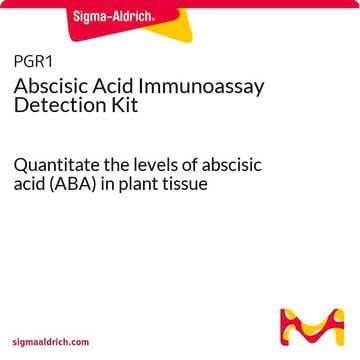862169
2-cis,4-trans-Abscisic acid
synthetic, 98%
Synonym(s):
(±)-Abscisic acid, (2Z,4E)-5-(1-Hydroxy-2,6,6-trimethyl-4-oxo-2-cyclohexen-1-yl)-3-methyl-2,4-pentadienoic acid, ABA, Dormin
About This Item
Recommended Products
Quality Level
Assay
98%
form
powder
mp
186-188 °C (lit.)
functional group
carboxylic acid
hydroxyl
ketone
storage temp.
2-8°C
SMILES string
CC(\C=C\C1(O)C(C)=CC(=O)CC1(C)C)=C\C(O)=O
InChI
1S/C15H20O4/c1-10(7-13(17)18)5-6-15(19)11(2)8-12(16)9-14(15,3)4/h5-8,19H,9H2,1-4H3,(H,17,18)/b6-5+,10-7-
InChI key
JLIDBLDQVAYHNE-LXGGSRJLSA-N
Looking for similar products? Visit Product Comparison Guide
Related Categories
General description
Application
- Chiral Separation of Abscisic Acid: Research demonstrated direct chiral separation of abscisic acid using high-performance liquid chromatography with a phenyl column and a gamma-cyclodextrin mobile phase, advancing the analytical methods essential for studying plant stress hormones (Terashima et al., 2023).
- Xanthine Oxidase Inhibitory Activity: A study including abscisic acid derivatives showed significant xanthine oxidase inhibitory activity, offering potential health benefits and therapeutic applications (Miyata et al., 2019).
- Anticancer Potential: Extracts containing abscisic acid from mangrove endophytic fungi exhibited cytotoxic properties and induced G(0)/G(1) cell cycle arrest and apoptosis in human cancer cells, highlighting their potential in cancer treatment strategies (Zhou et al., 2018).
- Antidiabetic Activity: Extracts involving abscisic acid from an endophytic fungus showed promising antidiabetic activity, potentially improving treatment options for diabetes through natural product research (Uzor et al., 2017).
- Glucose Tolerance and Insulinemia Reduction: A groundbreaking study found that microgram amounts of abscisic acid in fruit extracts significantly improve glucose tolerance and reduce insulin levels in rats and humans, suggesting its use as a dietary supplement for managing diabetes (Magnone et al., 2015).
Storage Class Code
11 - Combustible Solids
WGK
WGK 3
Flash Point(F)
Not applicable
Flash Point(C)
Not applicable
Personal Protective Equipment
Choose from one of the most recent versions:
Already Own This Product?
Find documentation for the products that you have recently purchased in the Document Library.
Customers Also Viewed
Our team of scientists has experience in all areas of research including Life Science, Material Science, Chemical Synthesis, Chromatography, Analytical and many others.
Contact Technical Service







